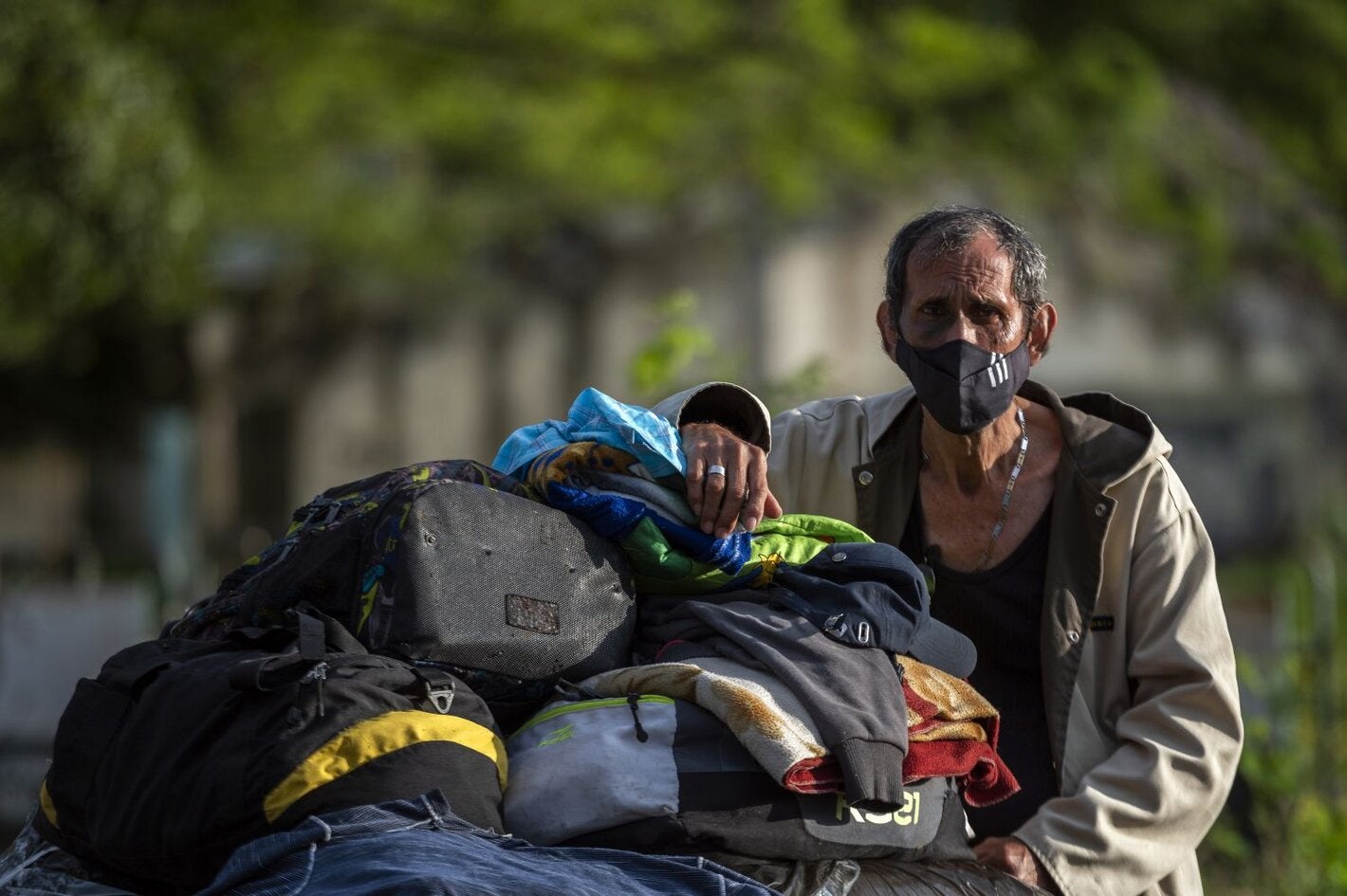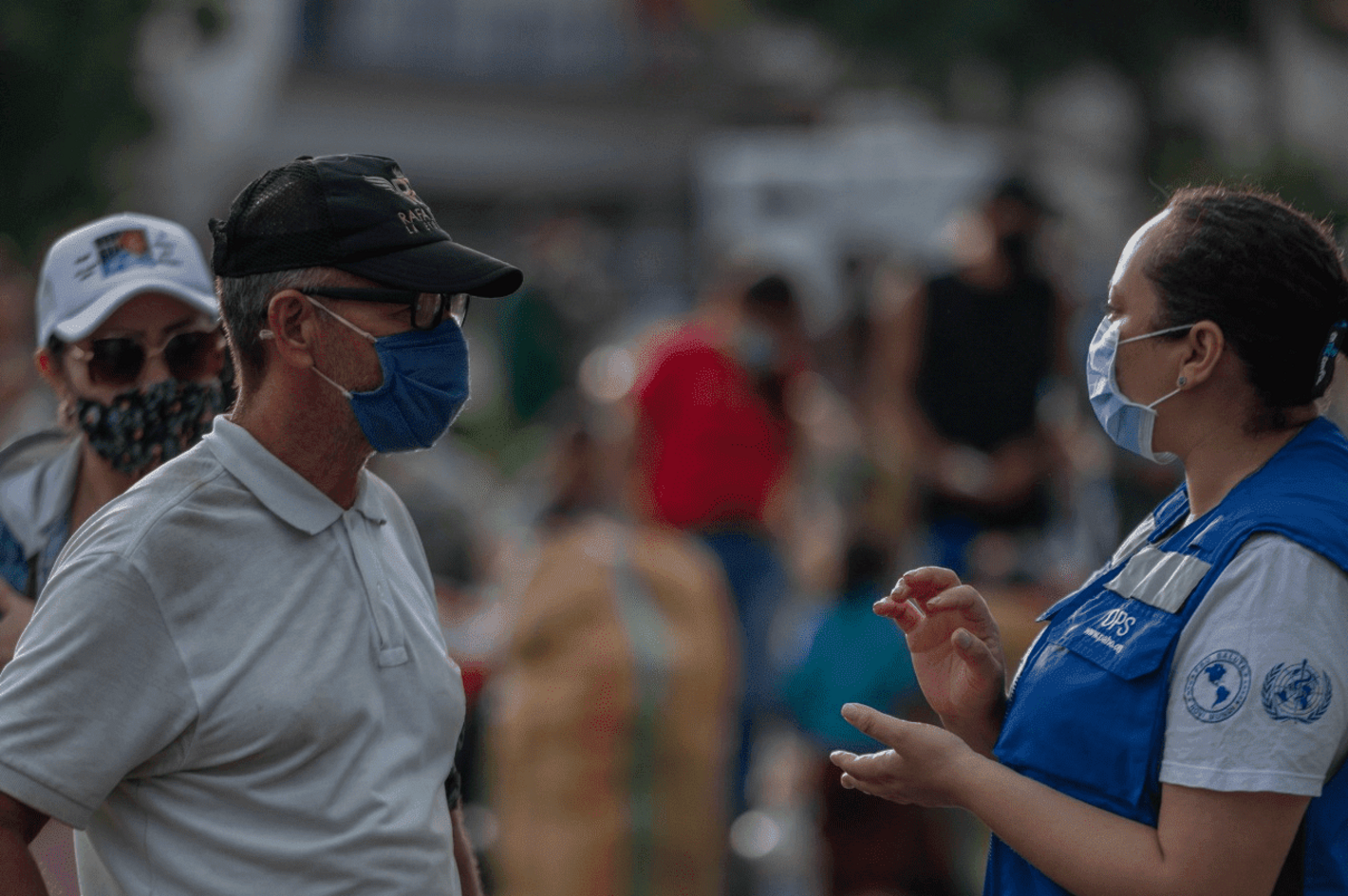About the Information Platform
The Information Platform on Health and Migration in the Americas provides easy access to qualitative and quantitative evidence on health and migration gathered from research and information mapping exercises, and focused on knowledge management activities and interactive digital repositories.
The data on the Platform serve to inform policy-making that is based on evidence, legislation, and human rights, as well as a resource for the design and development of training materials, public health projects and interventions, and health and migration research initiatives.
It includes interactive dashboards on policy, legal, and regulatory frameworks, as well as scientific literature on health and migration, where data can be explored through dynamic panels and various filters can be used for analysis.
The information compiled here is the result of collaboration with various actors in the Region, including academic and research institutions with years of expertise on issues related to health and migration.
Interactive dashboard description
The interactive dashboard maps the policy, legal, and regulatory frameworks on health and migration with a human rights-based approach in 19 countries of the Americas, at the national and international levels. This resource is aimed at guiding decision-makers and actors from different sectors tasked with developing, updating, and improving policies, laws, legislative and regulatory frameworks, plans, and programs so that they include protection of the health of migrants in a comprehensive manner.
It offers 1) a comprehensive overview of the current state of the international legislative framework on health and migration from a human rights perspective, and 2) national trends at the constitutional, legislative, and planning levels.
It highlights key instruments that countries have developed and focuses on promoting the protection of fundamental freedoms and human rights, such as the right to health.
The interactive dashboard includes:
- International treaties
- Recommendations, comments, and reports from conventional and non-conventional mechanisms for compliance with United Nations and Inter-American Human Rights System treaties
- National plans, strategies, and policies
- Jurisprudence
- National laws, decrees, and regulations on the topic
- Other documentation on the protection of human rights and the explicit legal recognition of the right to health
Dashboard highlights
652 documents
144 documents containing both health and migration components
key issues
types of documents of national, regional, and international importance
subregions
*Last data updated: December 2023
The Pan American Health Organization (PAHO) launched a study focused on collecting, analyzing, and systematizing information on policy, legal, and regulatory frameworks on health and migration with a human rights-based approach at the national and international levels, starting with 19 countries in the Region of the Americas. The research was conducted in collaboration with a research team at the School of Law of the Universidad Torcuato Di Tella in Argentina.
The dashboard is an interactive digital repository that facilitates the dissemination and dynamic visualization of research findings. It offers a comprehensive overview of the current state of the international legislative framework on health and migration and national trends at the constitutional, legislative, and planning levels. It is a resource to guide decision-makers and actors from different sectors in the Americas in developing, updating, and improving policies, laws, plans, and programs that include migrants in a comprehensive manner, from a human rights perspective. It highlights key instruments that countries have developed and focuses on promoting the protection of fundamental freedoms and human rights, such as the right to health.
The dashboard includes national plans, strategies, and policies; international treaties; recommendations, comments, and reports from conventional and non-conventional mechanisms for compliance with the United Nations and the Inter-American Human Rights System treaties; jurisprudence; national laws, decrees, and regulations on the subject; and other documentation related to the protection of human rights and the explicit legal recognition of the right to health.
The research highlights key points related to trends found in the Americas on policy, legal, and regulatory frameworks on health and migration, and how well they abide by universal and regional human rights standards.
In line with commitment to solidarity and protection of the right to health, several countries in the Region have made headway on specific plans, strategies, and policies on health and migration, including interventions that address the specific needs of this population and promote their physical and mental well-being. Likewise, there are national legal frameworks on migration that incorporate important elements on the health of this population, together with health planning instruments that integrate key contextual aspects of migration in the country, as well as the health needs of this population and actions to address them from the health sector and in collaboration with other institutions.
Despite efforts to remove barriers to universal access to health services for migrants, legislative and regulatory frameworks sometimes contain obstacles that can affect access. For example, immigration status can be a determinant of whether or not a person has access to the health system since, in many countries, a national identification document must be presented to access primary, secondary, or tertiary health services.
Language and cultural differences are a major barrier to accessing health services for the migrant population. This also hinders medical due process and, above all, health promotion (as well as screenings and treatments, provision of informed consent when required, and data for statistics). For a number of reasons, the migrant population often finds it difficult to access information on the legislative and legal frameworks of the justice system and migration policy, their rights and obligations, and the steps for accessing the health system in the country of destination or transit, which could constitute a human rights violation.
In addition, some migrants do not seek care or do not visit a health center for fear of being discriminated against or stigmatized. Likewise, a high proportion of people with informal jobs or an irregular status do not have health coverage or other social security benefits, further discouraging them from turning to the health system for prevention services, risk monitoring, or medical care.
Given the current challenges, it is important to provide health workers with continuous training and raise their awareness of the specific needs of migrants, in particular their rights and the cultural differences with the destination country. It is also important to promote information campaigns with a person-centered approach and the involvement of various branches of government, within legal and regulatory frameworks that grant explicit rights and recognize the duties of the State in compliance with the human right to health.
To continue addressing these and other barriers and to make progress in terms of the inclusion and comprehensive protection of this population in the formulation of all policies, laws, and programs, it is essential to have the active participation of various sectors and interest groups such as civil society, academia, the media, international organizations, community leaders, and coordination mechanisms and networks.
Interactive dashboard description
This interactive dashboard maps scientific articles on health and migration at the national and international levels in the countries of the Region of the Americas. It shows the current state of scientific literature on the health of migrants, refugees, and persons on the move in the Americas.
The dashboard is a tool to guide academics, health workers, decision-makers, and actors from various sectors in the Americas in formulating plans and programs that include the health of migrants in a comprehensive manner.
It includes articles, researchers, and institutions working on health and migration, together with summaries of key research findings, particularly in the areas of health systems, health outcomes, and social determinants of health.
Dashboard highlights
933 scientific articles from 24 countries including:
- literature reviews
- case studies
- quantitative studies, qualitative studies and multimethod studies
- categorized under "other methodologies"
12 sub-categories within health systems
sub-categories within health outcomes
sub-categories within social determinants of health
551 institutions throughout the Region
979 lead or corresponding authors
*Last data updated: December 2023
The Pan American Health Organization (PAHO) launched a study focused on collecting, analyzing, and systematizing a review of scientific literature on health and migration at the national and international levels from the countries of the Region of the Americas. This was done in collaboration with a research team from the Social Studies in Health Program of the Institute of Sciences and Innovation in Medicine (ICIM) at the Universidad del Desarrollo in Chile.
The interactive dashboard maps scientific articles on health and migration in countries of the Region of the Americas at the national and international levels. It shows the current state of scientific literature on the health of migrants, refugees, and persons on the move in the Americas.
The dashboard is a tool to guide academics, health workers, decision-makers, and actors from different sectors in the Americas in formulating plans and programs that include the health of the migrant population in a comprehensive manner. It highlights key evidence supporting these processes, including fundamental areas of health systems, health outcomes, and social determinants of health.
The dashboard was developed based on a narrative literature review of texts indexed in the Web of Science and PubMed databases. This information was supplemented through keyword searches in Google Scholar of texts not indexed in these databases.
The dashboard simultaneously shows: (1) descriptive results of the studies identified in this review of scientific literature; (2) lead and corresponding authors of those works; and (3) institutions linked to the authors of the studies in the review.
The information on the dashboard can be consulted by topic (health systems, health outcomes, and social determinants of health of migrants in the Americas) and sub-topic associated with each of these general topics, type of study, study objective, and country where the study was conducted, among others. Summary sheets included in the dashboard contain the main findings under the various health topics.
Interactive dashboard description
This interactive dashboard seeks to capture information collected by countries on the health of migrants to inform policy decision-making related to migrants in the Region of the Americas. Presents a summary of publicly available data points and methodologies used for data collection on various health topics, including year of collection and sources. The information displayed on the dashboard has been approved by governments and will be updated periodically. Additional countries will be added to the dashboard with the goal of expanding to as many countries as possible to get a more comprehensive view of the type of migrant health data points being collected in the region.
The goal of the dashboard is to allow policymakers and other actors to better understand the type of data that countries in the region collect, how it is collected, and identify potential gaps or areas that can be strengthened.
The Pan American Health Organization (PAHO) began working together with the United Nations Economic Commission for Latin America and the Caribbean (ECLAC), and in collaboration with the governments of the region, to better understand the type of data they collect. governments of the region of the Americas related to migration and health, as well as the periodicity, records and methodologies used for data collection.
This interactive dashboard, which has been approved by governments, displays data points collected on health and migration at the national level in countries in the Region of the Americas. It seeks to provide a practical tool for policymakers and other actors to gain an overview of data collection in the region to better understand what type of data is being collected, how, and identify potential gaps. The information can be used to further strengthen the data included in national migration-related health information systems, in order to improve health outcomes for migrants and host communities.
The dashboard includes: an overview of data points being collected in the region, with health topics and subtopics, migrant groups, years/periodicity of data collection, and sources; more details about the records of the collected data. The information included in the dashboard will be updated periodically and expanded to more countries to provide a more complete and comprehensive view.
The four main health topics included are: (1) determinants of health, (2) vital statistics, (3) health status, and (4) health systems. Subtopics associated with each include, but are not limited to, access to health care, chronic diseases, communicable diseases, maternal and child health, and mental health.
1. What is the main objective of the Information Platform on Health and Migration?
3. Why is the Platform important?
4. What geographic area does the Platform cover?
6. When was the information on the interactive dashboards last updated?
7. Who performed the research?
Answers
1. What is the main objective of the Information Platform on Health and Migration?
The Platform will serve as an interactive digital repository and as a space for the dissemination and exchange of information and knowledge on health and migration in the Region of the Americas. This practical tool is aimed at the various stakeholders who work on health and migration topics and is a resource to guide the development of inclusive, evidence-based policies, as well as the design and implementation of public health interventions, research projects, and training activities, among other initiatives in this field.
2. What is on the Platform?
The Platform is divided into the following sections:
1) Mapping of policy, legal, and regulatory frameworks on health and migration in the Region of the Americas, with a human rights-based approach.
2) Mapping of scientific literature on health and migration.
Each section is presented separately and contains interactive dashboards with filters that can be applied in various categories to facilitate searches for specific information and analysis. There are instructional videos on the Platform on how to navigate each dashboard.
Why is the Platform important?
The Platform is important in order to better understand information gaps, trends, and available evidence on health and migration in the Region. This includes existing information on policy, legal, and regulatory frameworks, as well as advances in research on various health topics. The Platform also offers a way to facilitate analysis, guide initiatives on the issue, identify key areas and points of collaboration, and promote evidence-based policy-making.
4. What geographic area does the Platform cover?
The Platform focuses on the Region of the Americas as a whole, but this may vary in some sections, such as the section on policy, legal, and regulatory frameworks on health and migration, which currently only includes Spanish- and Portuguese-speaking countries. In contrast, the scientific literature section includes studies on health and international migration throughout the Region, regardless of where the migration originated and where the research was conducted.
5. Who is this Platform for?
The Platform is for all stakeholders involved in developing health and migration policies, laws, and programs, as well as intergovernmental organizations, health professionals (doctors, nurses, community health workers, etc.), researchers, the private sector, universities, foundations, and nongovernmental and civil society organizations.
6. When was the information on the interactive dashboards last updated?
The date that the information was last updated can be found directly on each dashboard.
7. Who performed the research?
Research for the section on policy, legal, and regulatory frameworks on health and migration was conducted in collaboration with the Faculty of Law at the Universidad Torcuato Di Tella in Argentina. The section on scientific literature was developed in collaboration with the Social Studies in Health Program of the Institute of Sciences and Innovation in Medicine (ICIM) at the Universidad del Desarrollo in Chile.











